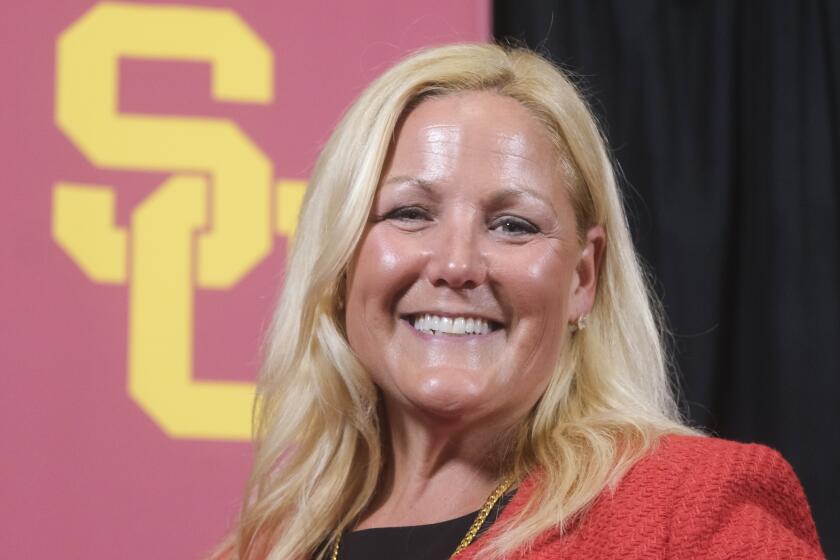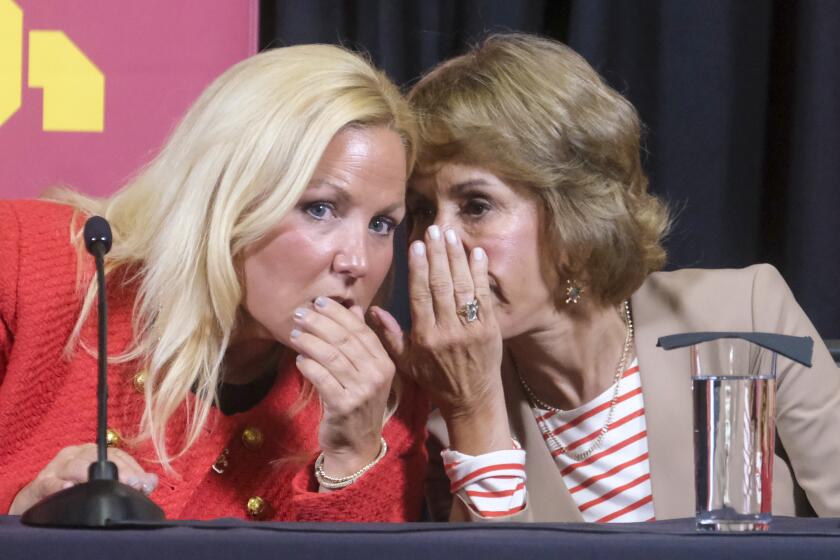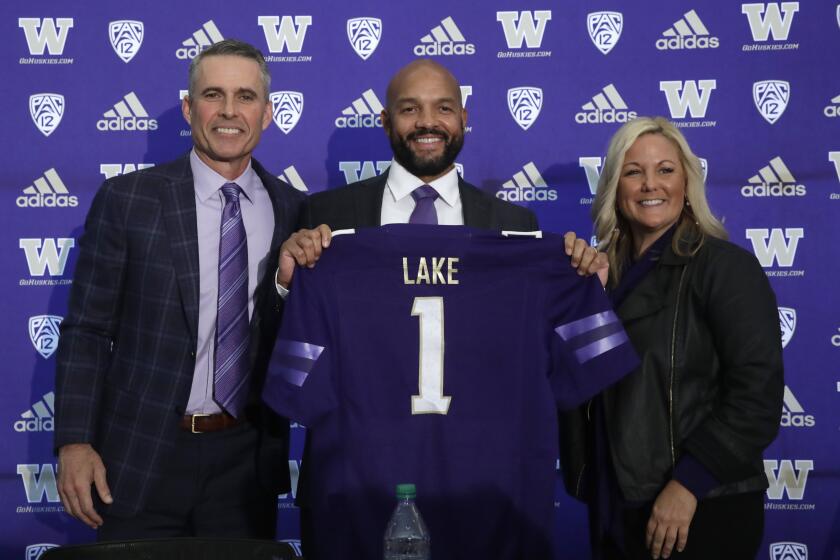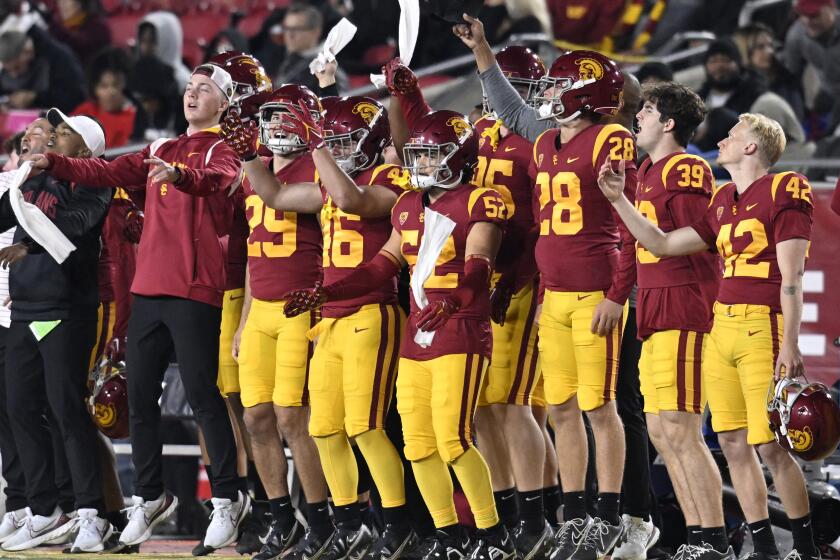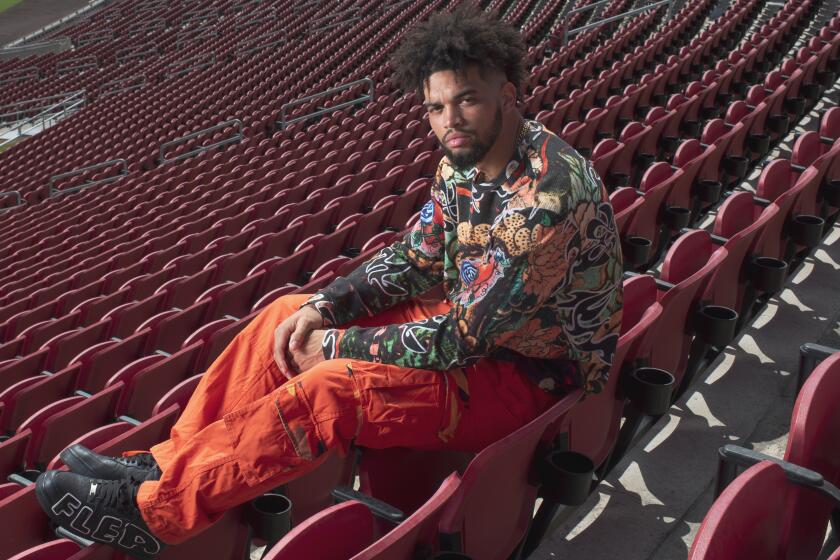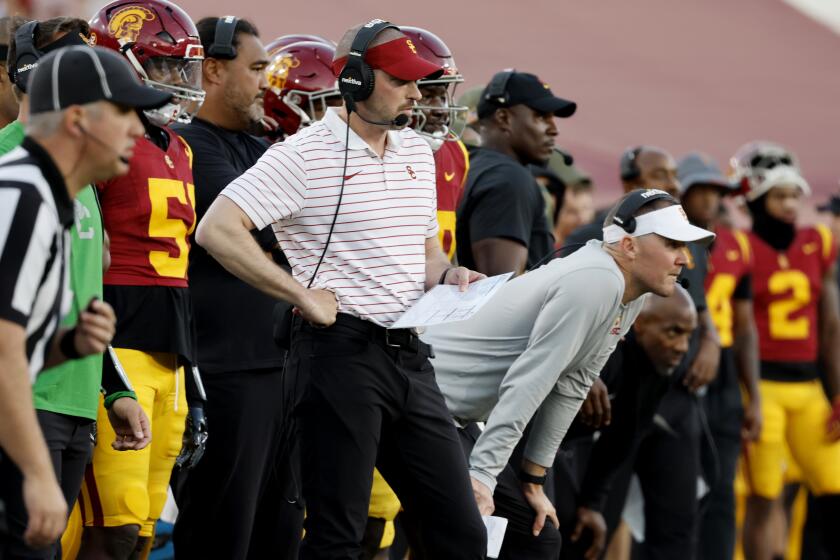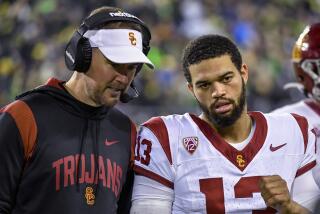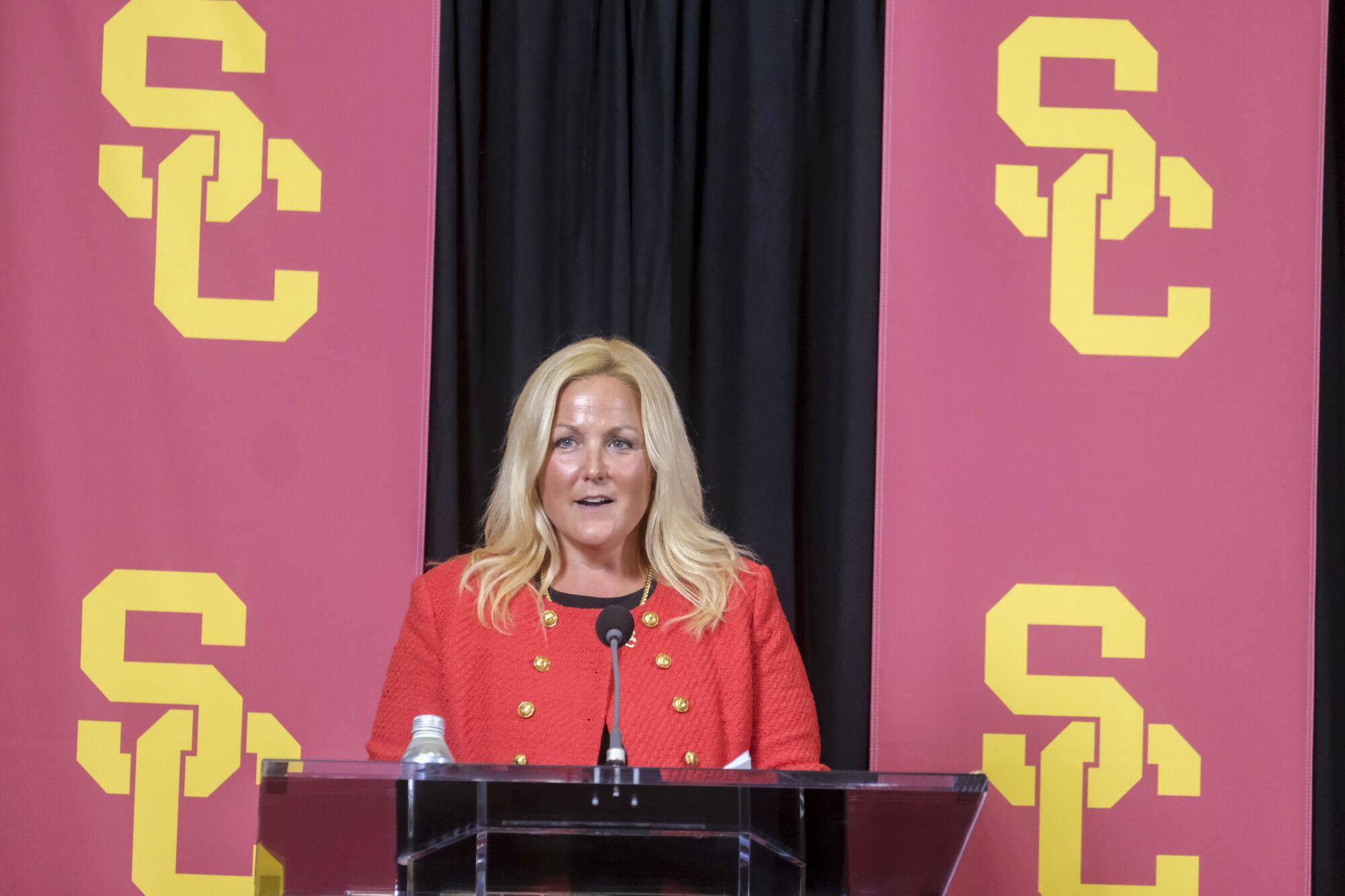
- Share via
The holiday weekend traffic on Interstate 5 had slowed to a crawl, the thrush of cars inching toward SeaTac airport moving at a painfully slow pace. Jennifer Cohen was already beyond antsy. She hadn’t seen her youngest son, Dylan, since before she became USC’s newest athletic director. Their last visit was in early August, almost four months earlier, when Cohen found herself balancing Washington’s impending move to the Big Ten with moving Dylan into his Montana dorm room.
But Montana, where Dylan is a freshman offensive lineman, had a first-round bye in the FCS playoffs last week, while USC had an unusually late bye baked into its football schedule. So Dylan flew west from Missoula, and Cohen flew north from L.A. to spend a rare few days in Seattle with her boys — her first real respite since taking the reins at USC in late August.
As Cohen and her ex-husband inched toward the terminal to pick Dylan up, Cohen considered jumping out of the moving car to run the rest of the way. She pictured the whole scene playing out in slow motion.
USC has hired Jennifer Cohen, currently at Washington, to serve as athletic director and steer the Trojans through their transition to the Big Ten.
Her son leaving for college had, for Cohen, been an especially formative moment. At 54, both her boys — Dylan and older brother Tyson — were on their own. That meant coming home to an empty house, and the enormity of that realization hit her pretty hard last summer. Hard enough, at least, to consider leaving the place she’d spent nearly half of her life.
“You never really are told by people that, like, ‘Hey, this is a pretty traumatic change in your life,’” Cohen said this week. “When you become an empty nester and you see your kids go and move on and change the way that they rely on you and just the structure of that, like, you just don’t know what that’s going to feel like to have that change.”
With her life changing at home, Cohen wondered more about what she should do next professionally. She’d worked the past 25 years at Washington, starting in the department in 1998 as an assistant director of development and building a reputation over the years as an ace fundraiser. By the time she was elevated to athletic director in 2016, Cohen’s roots ran miles deep in Seattle — so much so that, as a young girl in Tacoma, she’d written letters to legendary Husky coach Don James.
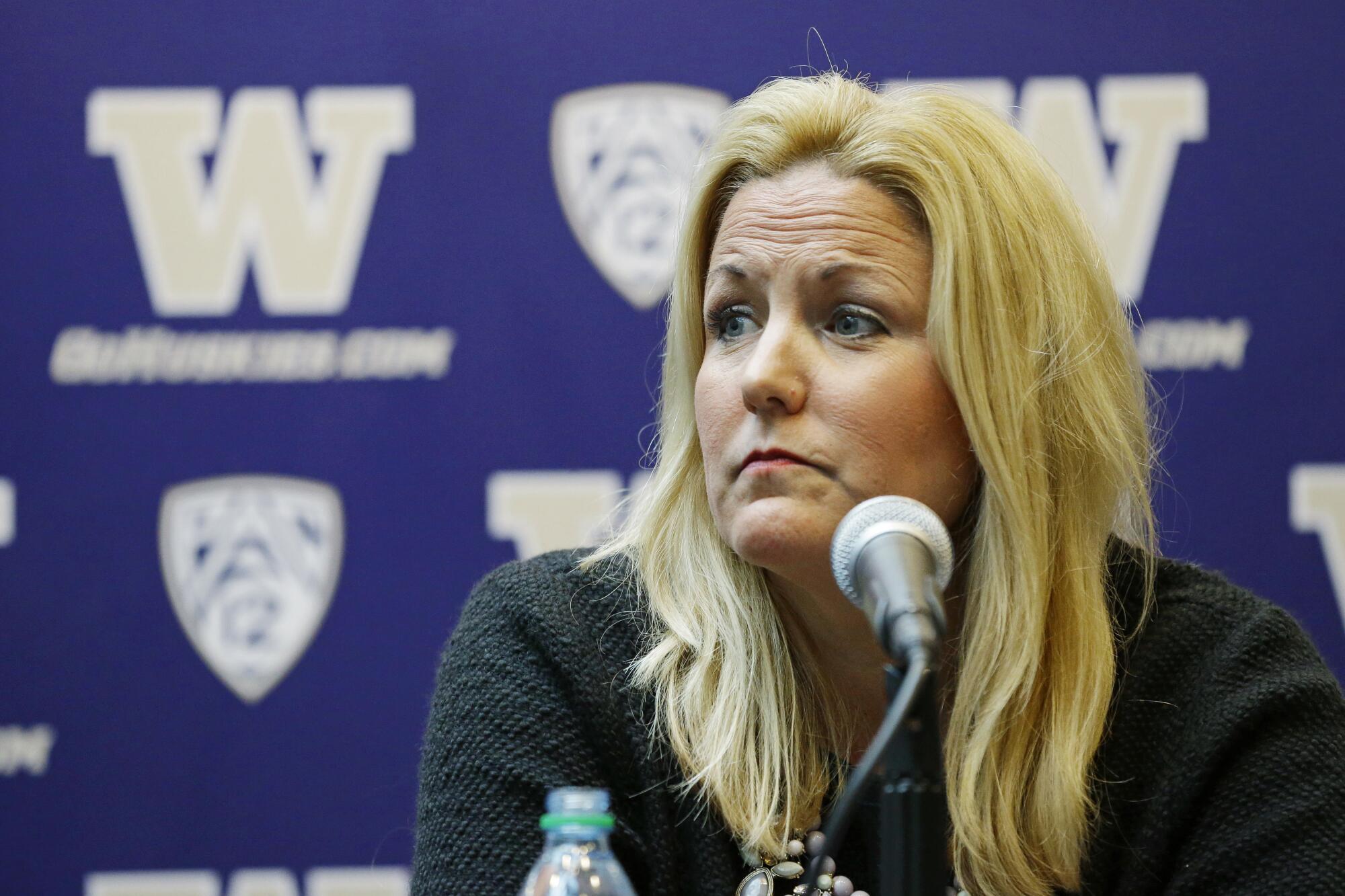
Leaving those roots behind wouldn’t be easy, of course. But with both boys now out of the house, Cohen couldn’t shake the feeling that she needed something new, something different.
Then, USC called.
“We went through a lot to build what we built [at Washington] and that’s what I want to do here,” Cohen said. “But I wanted to do something different, you know? I wanted to stretch myself.
“I think it’s great when you take an opportunity where you’re not running from anything. I didn’t need to leave [Washington]. I was very secure there. It wasn’t that I was unhappy. I just had an itch to say, ‘Hey, I just want to try to see if I can do this thing, in a different place, at a different time in my life.’”
Jennifer Cohen’s success as USC athletic director will mostly hinge on working with Lincoln Riley to ensure USC becomes a college football juggernaut.
Three months later, Cohen returned from visiting her sons in Seattle ready to finally move into her new home in Manhattan Beach — a final, symbolic leap into her new life.
Since taking the USC job in late August, most of her days have been a whirlwind. She barely introduced herself to football coach Lincoln Riley before the season kicked off five days later. Most of her time in the weeks that followed were focused on meeting with as many people as possible, tending to the basic health of the organization, which languished during the year prior to her arrival.
For the better part of the past decade, really, USC’s athletic department had been a picture of instability at the top. Four athletic directors, three of them former Trojan football heroes, resigned during the previous 13 years. Mike Bohn, her immediate predecessor, was forced out in May after accusations of mismanagement and inappropriate conduct were levied against him during an outside law firm’s investigation.
Cohen understood the situation she was inheriting. She had her own questions about the culture at USC and whether she was the right person to right the ship.
“But then, at some point in time, you bet on yourself,” Cohen said.
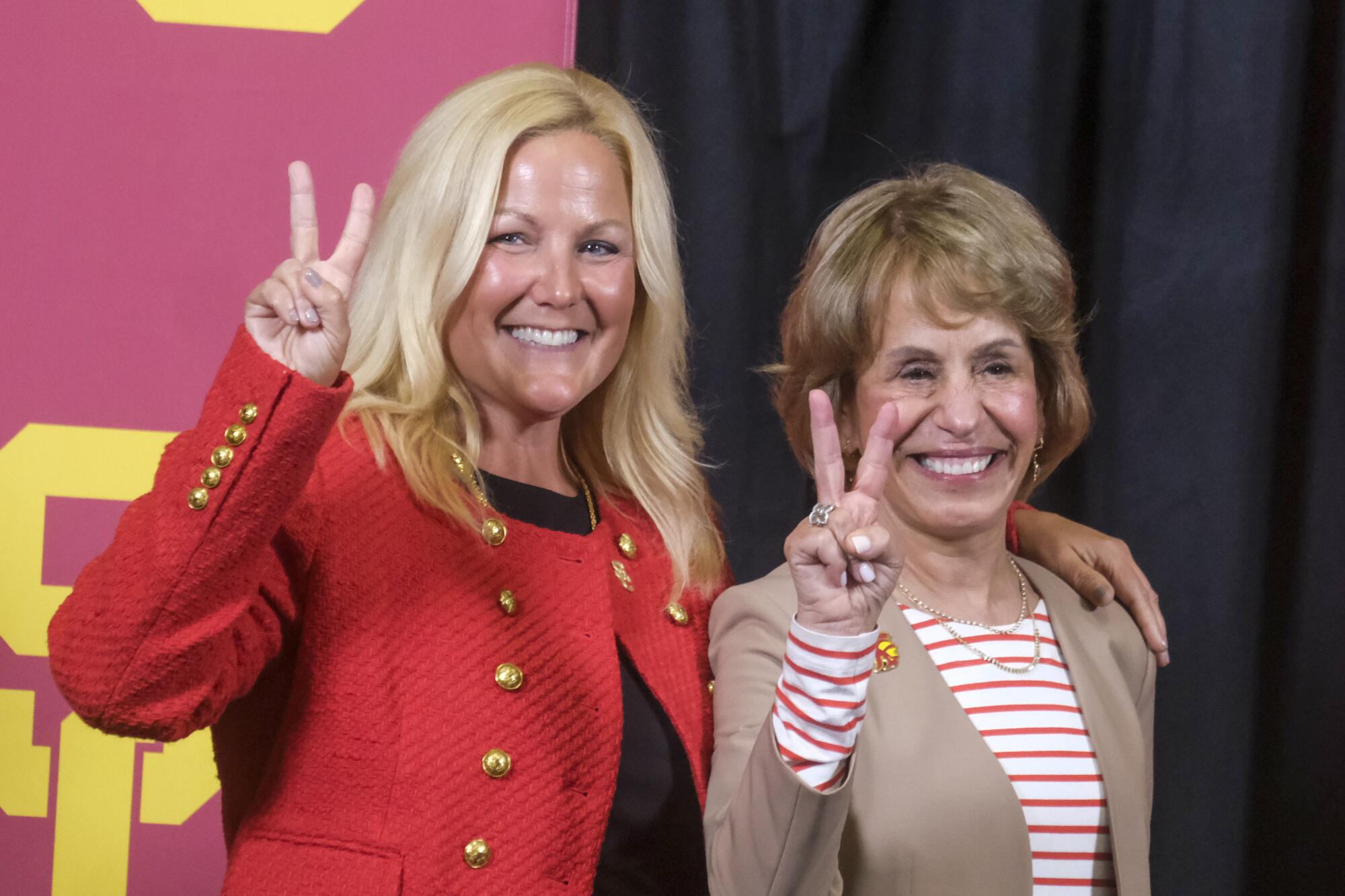
Cohen is feeling pretty good about that bet so far. She sat down this week with The Times to discuss her first three months on the job at USC, the state of the department and its name, image and likeness operation, the disappointing end to USC’s football season and how she’s working with Riley to find a defensive coordinator.
The following conversation has been edited for length and clarity.
Los Angeles Times: When you stepped in at USC, I’m sure you had your own perception about the state of the department. Where have you found that perception was accurate? And where has it maybe differed from what you expected?
Jennifer Cohen: The fun thing about taking a new job like this is that you have a lot to learn about the place itself, about the people, about the school, the history, the traditions, the culture that exists, and just understand the uniqueness of this place. A lot of things I believed to be true about this place have even exceeded expectations as far as just the university as a whole and how special it is. It’s one of the best universities, not just in the country, but in the world. That’s really cool. That’s really powerful. Because that fuels your brand, right? And the brand here is so strong, the reputation, what it means to be at USC, holistically, that fuels the whole Trojan family, and I never really understood what that meant until I was here.
People really care about this place. So I love the combination of that on a very large stage. A big part of my learning experience is just kind of understanding that.
Former Washington football coach Chris Petersen discusses his close bond with Jennifer Cohen, who led the Huskies and now is USC’s new athletic director.
I think organizationally, there are so many people that are so committed to this place, and I heard a lot about culture here. I think there’s a lot of strong pieces that are already put in place. And the main thing about this work is that everything’s changing, and it’s so rapid in the way that it’s changing.
And for sure, in college sports, it’s changing. More so than we saw for probably the first 20 years of my career, and the schools and the athletic departments that get their stakeholders to get aligned around how they’re going to work together to adapt to that change are the schools that are going to come out on top.
We have pieces of that that are already in place here. But really my main focus and my main goal is to get all these stakeholder groups that equally matter to be great and get everybody working in the same direction, so we can manage all the other instability of what’s going on. If we’re stable with each other, we’re going to be able to ride through that and come out on top. So that’s really kind of where my focus is right now.
This is not a department that’s used to stability. Could you sense that when you took over the job? Where did it stand, in your mind?
There’s a lot of pride here, you know, and I think there’s a lot of people that have been working really hard, and when I meet with student athletes, you get a lot of really positive feedback.
One thing that really popped to me was whatever lack of stability was going on within the organization from a leadership standpoint, it didn’t necessarily trickle down to every student athlete. So I think that’s positive.
I think it’s just kind of basic organizational health. Like getting everybody to have clarity about their roles. We’ve been doing these exercises with our staff about everything from role clarification to clear priorities for the department moving forward and who’s going to do what and making tough decisions. Just general leadership. Because the department didn’t have a lot of that. Even in the interim, you had [now-senior women’s administrator] Denise [Kwok] doing a great job, you had a third-party [Huron Consulting Group] come in. They really helped fill the gap. But there’s a lot of decisions that don’t get made until a new leader comes, and so just trying to give clarity on some of the most important things as soon as I could.
The team’s just really hungry for somebody that will help guide them into the future. Like, there’s a real eagerness from the staff.
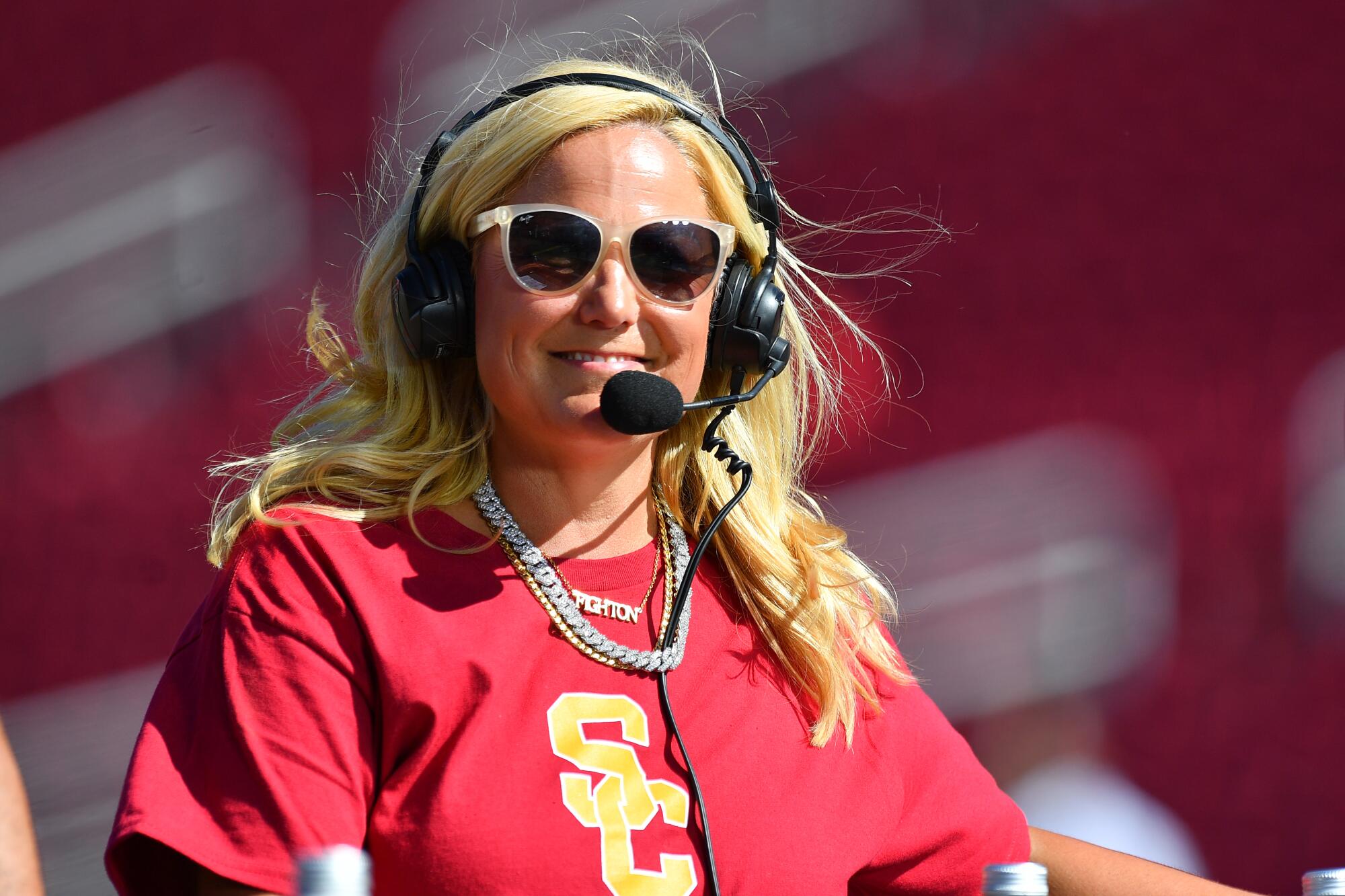
Name, image and likeness has become such a major topic of conversation across the country, including at USC .…
Well it’s just so critical. I mean, it’s absolutely woven into our job here.
Our North Star is to aspire to be the unmatched, unquestioned top destination for student athletes to come and reach their full potential in everything that they do. That’s winning and competitiveness. That’s also academics, that’s developing yourself for life after college. And when I look at that North Star that we have, I mean, you’d be silly not to say that NIL is a big part of prioritizing that, along with great coaches, facilities and other resources that you want to create in an environment where kids can be their full selves.
It takes everything, but NIL is a big piece of that. First of all, I think this is the greatest place in America for NIL. I don’t know if there’s a school that could do NIL better than USC because you’ve got the stage, and you’ve got the natural brand market right here, and USC has always held its place in the L.A. sports market. A lot of strong alumni base lives in this region, works in this region, that can connect kids to brands and that cares deeply about that.
So that’s one punch, like unbelievable. Try to match that. Good luck; you’re not going to if you’re a competitor. And then the second side of that is how do you build a very strong donor collective? And how do you do both of those at the same time? Because when you’re doing those both at the same time, it’s really hard to match that.
So this is going pretty darn well and can keep growing and evolving. And this is where we’ve spent a little bit more time really clarifying. We have incredible agencies that are doing a lot for our student athletes, especially former student athletes that are involved with groups like Tommy Group or Conquest [Collective] matching student athletes to brands, and that’s amazing. We also have House of Victory which is truly a donor collective, where we have donors giving money and student athletes are doing community service projects. House of Victory also happens to be a corporate sponsor of ours, so they can do even more in that space. And that’s just the area we’ve been trying to create more clarity.
A new USC NIL collective, Victory Formation, is part of a wave of donors finding support from school leaders who once shunned third-party NIL help.
In the state of California, we can do a lot. We can do a lot more here than I was able to do at Washington for NIL. As athletic department employees, we weren’t allowed to engage in NIL like we are here at USC, and it’s been awesome for me.
I’m a fundraiser by nature. And so I just think this is just such an important piece of what we’re trying to do. And so is fundraising for the department. And so is building the new building for football and baseball and Rawlinson [Stadium] for women’s soccer and lacrosse. We can do it all here.
Why do you think the perception of USC has been that it struggles with NIL (fundraising, collective relationships and infrastructure to support athlete endorsements)?
I certainly didn’t see that when I came in. What I saw was, “Hey, how do we create clarity around this? Because we’re seeing a lot of student athletes with some pretty impressive deals here.”
What I did experience was maybe more of a lack of alignment about what we can do as an athletic department and how can donors really support us. And where do you go to do that?
I think everybody’s been working through, you know, how does this work? Ultimately, coaches have to figure out what their philosophy is and how they’re managing that within their own programs — from a roster standpoint, from a philosophy standpoint, from a culture standpoint, from a locker room standpoint. So you can’t really get all that humming until everybody’s kind of on the same page. It’s just been about creating more clarity there.
Caleb Williams and his father share the strategies they have used to put the USC quarterback in the best position to win on and off the field.
How do you balance building out USC’s NIL presence and asking for donors to that end, while also knowing you’re trying to build a football facility that’s a big part of the future of this program?
One, people that give money, they’re giving their hard-earned money and they should give to what they care the most about. And I believe it’s our responsibility to educate donors about what all their options are and the impact those options have and why they all matter. And let donors decide where they want to give their hard-earned money.
We’re USC. We have incredible history, tradition. Yes, we have great donor support. The Trojan family is unbelievable and we can and we will and need to do it all here. So there’s not one bucket that can get filled without us saying, let’s also find a way to fill this one, too. So we’re going to be tireless in asking people for support in all aspects of this program because that’s how we’re going to get ahead in the future.
And we need to deliver. People want to see [a return on investment] and what they’re investing into. So we have a massive responsibility. Our hands aren’t just out. It’s a partnership, and I think everybody that works here recognizes that we don’t feel entitled or owed anything. We owe it to everybody else to raise the bar to deliver on what they’re going to contribute to us.
This football season did not go as most people planned, Lincoln Riley included. Where is your confidence level with him as coach and the direction the program’s headed in?
First of all, really disappointing year. We had big goals, and we have high expectations for us here. And that’s why we’re here. He loves the pressure of that and the expectation of that, and so do I.
So disappointing and frustrating, not just for the coaches and the players, but obviously for our fans and for our former athletes. That’s not the standard, and that’s not where we’re going. As far as Lincoln goes, I have full confidence in him. He has my full support. It’s been incredible getting a chance to work more closely with him.
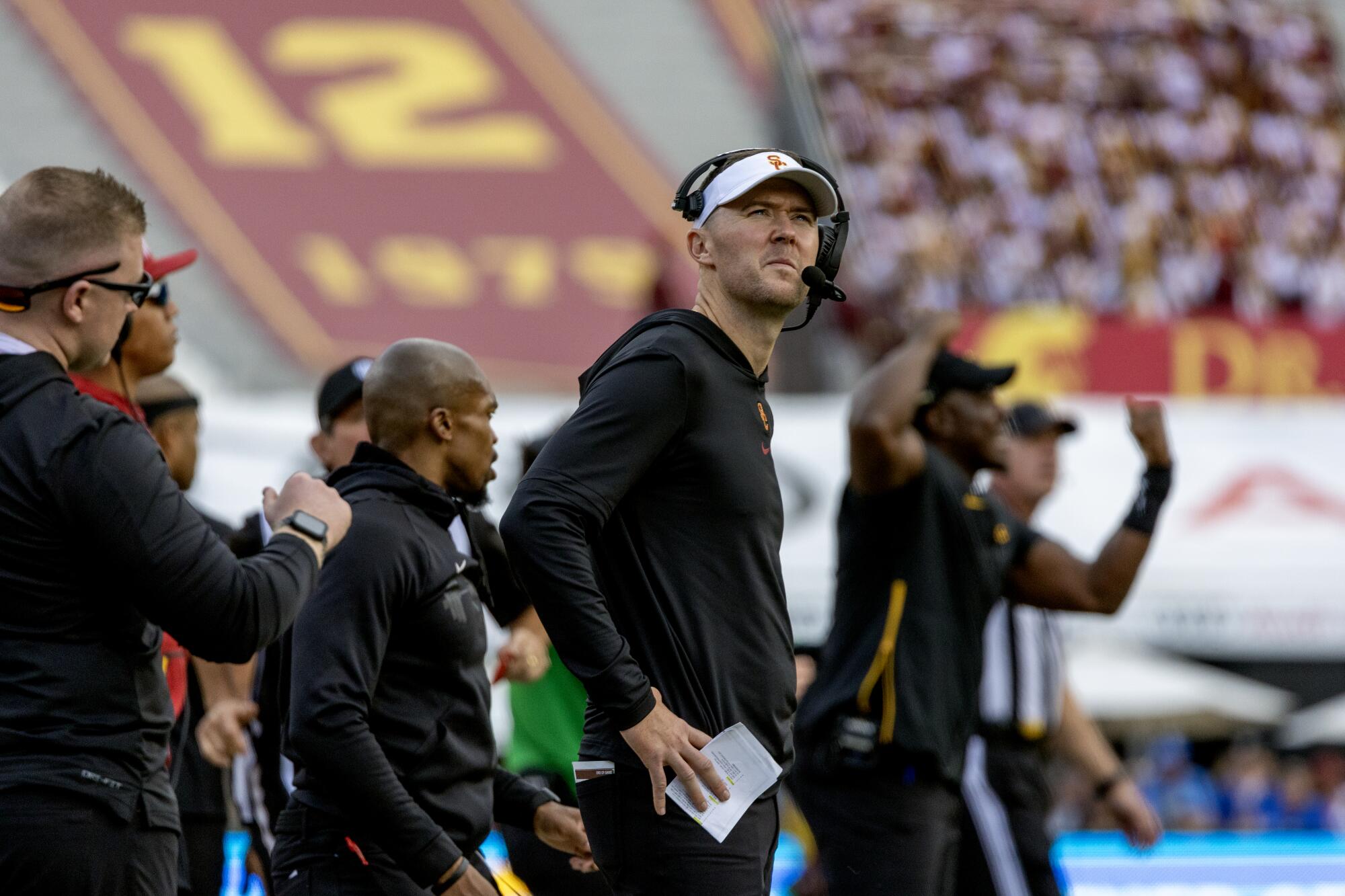
I started at a really unusual time for an athletic director to build the relationship with the football coach, and the relationship between the AD and the football coach is absolutely essential to the health and well-being of an athletic department. It’s a huge priority, and so I’ve been really pleased with just the conversations — the in-depth conversations — that we’re having about the program. We evaluate every program at the end of the year here — not just the football program, all of our sports. So we’re in that process right now, just kind of looking at everything. Obviously he made a decision on moving on the [defensive coordinator], and we’re in the process of that search right now.
We’ll be looking at everything. Every aspect of this program. Whether that’s personnel, whether that’s recruiting, whether that’s additional resources, how this facility is going to help, NIL. Everything needs to be on the table, every year, in every program. Because that’s how you continue to keep up and build a plan that’s more sustainable. So, I’m just looking forward to supporting him.
In regards to the decision to fire defensive coordinator Alex Grinch, we don’t know yet the input you generally expect to have with coaching personnel decisions — or how much you had in this particular case. Did you have conversations with Riley about it? Or how did that play out?
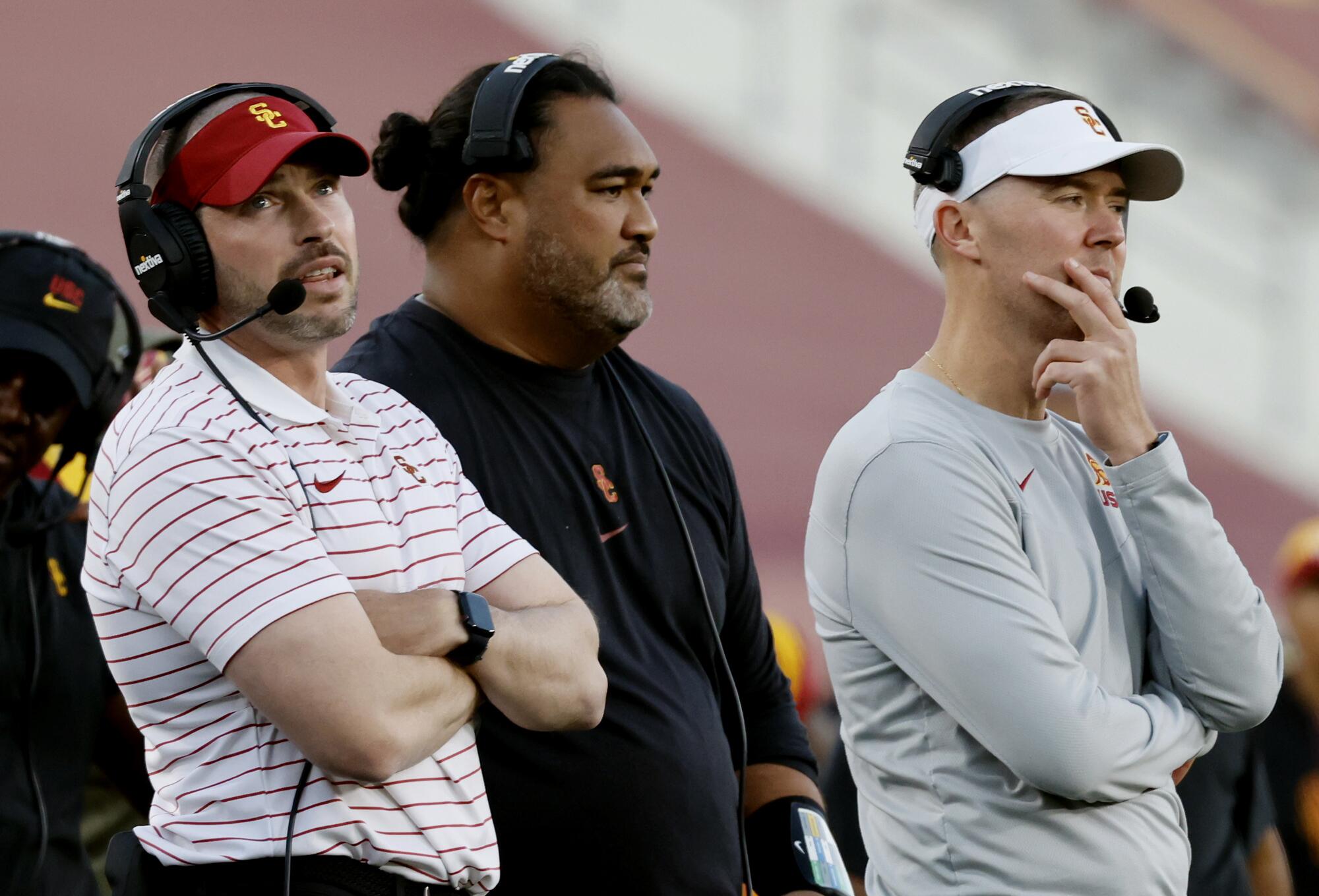
I mean, one, that was Lincoln’s decision, and I think it’s really important to acknowledge that was Lincoln’s decision, and that my job is to work with Lincoln ongoing, all the time, about the evaluation of the program and how we’re going to keep reaching the goals that we both have for this program, which are hefty, lofty and big, and that’s why we’re here and that’s what we’re motivated for.
So when things aren’t where we need them to be in any aspect of the program, we’re going to have conversations about it. Because we’re partners, and it’s my job to do everything I can to remove obstacles for him and our other coaches and also create opportunities for them, and provide the resources they need to be great. And personnel is a part of that.
On that same note, what’s been your role generally in finding a new defensive coordinator?
We’re looking at all aspects of the program right now and having in-depth conversations about every component of the football program right now. What we’re seeing, where we think we want to go, where we can invest strategically. So the DC search and the person that we put in that position is a very important hire for where we’re going. And so I’ll continue to be involved in those conversations with him.
In the wake of defensive coordinator Alex Grinch’s firing, USC coach Lincoln Riley is confident the Trojans will eventually “play great defense here.”
What can you say about where that search stands?
I would just say this about the process: To me, the coordinator searches almost do feel in some ways like a head coaching search now. It does. Over time, they’ve started to feel more like that, just as far as process, protocol, just how they work.
But what I would say is the process is a good healthy combination of urgency with diligence. Ultimately we will get the right person for this job. And that’s the most important thing. You want to act with urgency. You want to make sure that you’re going through your candidates and doing your process for that, but you also want to be diligent enough in this landscape that we’re in where there’s so much movement and change — and that’s just starting, the domino effects. We still have conference championship games to be played. So there’s going to be more change and churn in the whole landscape of college football.
And so we’re going to get the right guy, and we’re going to get him hired as soon as we can. But we’re going to make sure that it’s the best person for the job.
More to Read
Go beyond the scoreboard
Get the latest on L.A.'s teams in the daily Sports Report newsletter.
You may occasionally receive promotional content from the Los Angeles Times.

